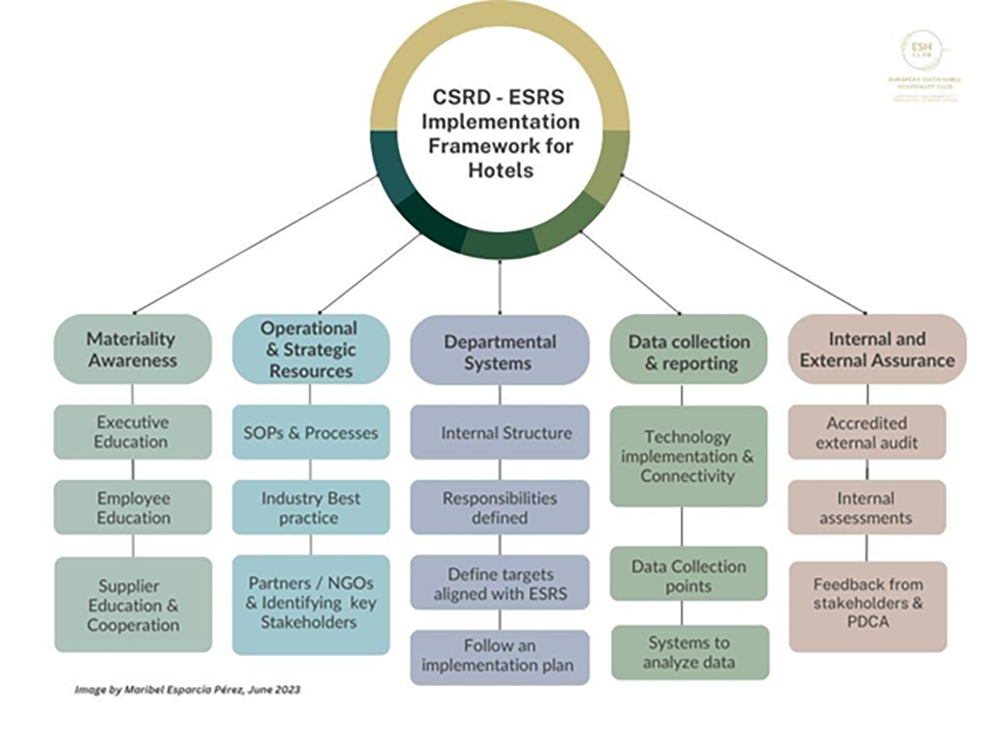Unlocking Value in Hotel Assets through Sustainability and ESG


Synopsis
The hospitality industry is increasingly recognizing the value creation potential of integrating sustainability and ESG criteria into hotel assets. With evolving regulatory frameworks and heightened investor and guest expectations, a proactive approach to ESG strategies and non-financial reporting is essential. Operational, physical, and transitional risks associated with climate change necessitate strategic risk mitigation through ESG practices, offering opportunities for retrofitting properties and enhancing asset value. However, challenges remain in adapting new regulations like the European Sustainability Reporting Standards (ESRS) and Corporate Sustainability Reporting Directive (CSRD) to the specific needs of the hotel sector. Despite these challenges, integrating sustainability and ESG factors is increasingly seen as a pathway to profitability, efficiency, and positive social and environmental impact in the hospitality industry. Maribel Esparcia Pérez provides some interesting insights.
Do sustainability and ESG factors create value in hotel assets?
Key factors driving change
The potential for the value creation of hotel assets through sustainability and environmental, social, and governance (ESG) criteria presents a transformative opportunity in the hospitality industry. The evolving and dynamic landscape of regulatory frameworks and standards across markets needs a proactive approach from industry stakeholders to navigate investors' requirements and guests' expectations. Furthermore, new regulatory requirements need expertise to formulate and execute ESG strategies and it is driving hospitality businesses toward a structured approach to sustainability and non-financial reporting. As we enter the new year, a proactive approach that goes beyond compliance is needed, acknowledging the increasing expectations of guests who now consider sustainability a fundamental in accommodation experiences, across segments. Furthermore, distribution channels, corporate requests, and online intermediaries intensify the significance of sustainability-related data and benchmarking for positioning assets. Investors, progressively prioritizing ESG data and impact-focused hotels, underscore the imperative for businesses to integrate practices in strategy that go beyond basic business practices, and instead, the intention and action to have a positive impact is at the business core.
Risks and Opportunities
Operational, physical, and transitional risks loom large over asset valuations, supply chains, access to capital, litigation, and insurance costs, especially in a climate change scenario where transitional and physical risks place hotel assets at threat of being stranded. Thus, managing sustainability and ESG criteria is critical as a strategic risk mitigation tool and to capture business opportunities. Retrofitting existing properties presents an opportunity for brands to enhance asset value while concurrently contributing to community well-being, preserving natural resources, and revitalizing local biodiversity. Despite challenges such as inflation, high interest rates, wars, and geopolitical uncertainties, the post-pandemic era offers an opportunity for profitability, efficiencies, and Average Daily Rate (ADR) growth, repositioning the underperforming stock of
hotel assets to maximize earnings and benefit nature and people.
Regulation and Implications for Hospitality Companies
In light of the 2023 ESG events, the adoption of European Sustainability Reporting Standards (ESRS) and Corporate Sustainability Reporting Directive (CSRD) regulation introduces a new era of non-financial data disclosure and obligations. Despite that, according to the KPMG ESG Assurance Maturity Index 2023, only 25% of companies feel they have the ESG policies, skills, and systems in place to be ready for ESG assurance, and 27% of them have robust policies and procedures to support the development of their ESG disclosures.
The standards published so far by the European Commission are sector agnostic, which can be a challenge to adapt to the hotel sector-specific challenges, fragmented structures, and systems. See in the image below the CSRD Hotel Framework for the ESRS implementation in hotel operations.

Materiality Awareness
The initial phase of this proposed framework starts with materiality awareness. The aim is to improve the awareness of industry stakeholders and education as part of this transition, understanding the context-based sustainability-related issues of each asset location and company operations scope. Conducting a materiality assessment and applying the double materiality approach is a key principle of the CSRD regulation, where the disclosures and scope include the company's financial performance and the impact of the company's activities, operations, and value chain on external stakeholders and society. For this phase, upskilling the hotel teams, suppliers and business partners will be essential to gather and monitor the non-financial data required by the regulation.
Operations and Strategic Resources
As part of the industry transformation and improved resilience, hotels have an opportunity to strengthen local commitments by partnering with social enterprises, sharing success stories, implementing industry-wide best practices, and broadening the scope of collaboration with local partners to scale impact. Hotel managers especially have a great responsibility to lead
this transition daily. Thus, it must be reflected in budgets and strategies by adopting sustainable initiatives, replacing current practices, and driving behavior change.
Departmental Systems
As part of the sustainability plans and strategy, hotels must include systems to track, monitor, and measure their impact on the different European Sustainability Reporting Standards reporting requirements which include climate, pollution, water and marine resources, resource use and circular economy, biodiversity and ecosystems, own workforce, workers in the value chain, affected communities, consumers and end users and business conduct. Thus, every department must be ready to implement those measurements in their daily operations and tasks.
Data Collection and Reporting
One of the primary focuses of ESG initiatives within the hotel industry has been the reduction of carbon emissions by 2050 or reaching targets for net zero strategies. However, a notable challenge exists in the potential misalignment of ESG criteria, where the hospitality business's selective approach may overlook broader sustainability industry issues. These might include biodiversity loss, tackling water stress, and the absence of comprehensive climate change adaptation and preparedness plans. Additionally, attention needs to be given to social issues such as ensuring living wages, creating flexible career opportunities that meet new generations' expectations, and combating corruption and human rights violations, especially in developing countries, regions with leakage, and low compliance assurance destinations. Therefore, establishing robust governance structures remains vital for hotels, groups, management companies, operators, and hospitality companies of all sizes. The aim should be to create long-lasting benefits for all industry stakeholders, some would label it as net positive strategies, where the industry creates positive impacts in all asset stages, and those last beyond a building life cycle, inside-out and outside-in. The regulation also provides a unique opportunity for hospitality stakeholders to use technology implementation to monitor the impacts of capital allocation businesses' sustainability and ESG plans. Leveraging technology can be a catalyst for elevating operational efficiency, allowing hotel teams to focus on more meaningful endeavors that align with broader societal and environmental objectives. As part of the regulation and the proposed
framework, to enable transparency, assurance, and control technology such as Clarity AI, Weeva, Clever analytics, Apidai, and others can be of help.
Internal and external assurance.
The recent backlash to ESG terminology should not be an excuse to stop the momentum of positive impact creation in the hotel investment space while not overshadowing other crucial factors for long-term value creation like productivity and innovation. The prevalence of short-termism and speculation in commercial real estate, looking at management contracts and dates without measuring the scope of environmental and social impacts, will persist as an obstacle to mainstream change. This might lead to a lack of transparency and can impede the effectiveness of ESG initiatives. With the internal systems and external assurance with a continuous improvement strategy, it can help not only to comply with ESRS disclosure requirements but also to create business opportunities for hospitality brands.
Conclusion
With less than six years ahead to meet the sustainable development agenda set by the United Nations, or the protection of biodiversity ecosystems agreed at global global biodiversity framework, by 2030, and the enforcement of the CSRD regulation marks the commencement of a new year where the hospitality industry has an opportunity to harmonize business objectives with the imperatives of nature conservation, thereby ensuring the well-being and prosperity of destinations and communities. Through collaborative innovation and educational initiatives, the industry can foster a paradigm shift towards sustainability and reevaluate established practices, thereby effecting positive and meaningful changes that generate enduring value for all business stakeholders.
References
- KPMG 2023, 'ESG Assurance Maturity Index 2023', KPMG, Available here (Accessed: 26th September 2023).
- European Commission 2023, 'Commission adopts European Sustainability Reporting Standards', European Commission Finance, Available here (Accessed: 31 July 2023).